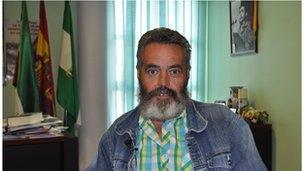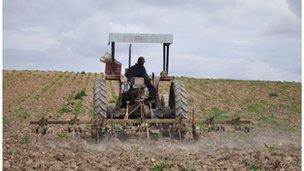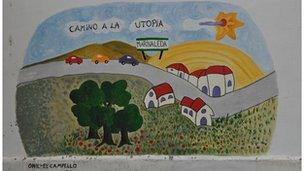Marinaleda: Will 'free homes' solve Spain's evictions crisis?
- Published
Tom Burridge reports from the town that's surviving the Spanish recession communist-style
In the wake of Spain's property crash, hundreds of thousands of homes have been repossessed. While one regional government says it will seize repossessed properties from the banks, a little town is doing away with mortgages altogether.
In Marinaleda, residents like 42-year-old father-of-three, David Gonzalez Molina, are building their own homes.
While he burrows with a pneumatic drill into the earth, David nonchalantly says it "should take a couple of years".
However, when his new house is finished he will have paid "absolutely nothing".
Free bricks and mortar
The town hall in this small, aesthetically unremarkable town an hour-and-a-bit east of Seville, has given David 190 sq m (2,000 sq ft) of land.
He and others are only eligible after they have been registered residents of Marinaleda for at least two years.
The bricks and mortar are also a gift, this time from the regional government of Andalusia.
Only once his home is finished will he start paying 15 euros (£13) a month, to the regional government, to refund the cost of other building materials.
Of course, most people do not know how to build a house, so the town hall in Marinaleda throws in some expertise.
It employs several professional builders and plumbers, a couple of whom work alongside David, to help him construct his house.
Taking the law into his own hands
The town's controversial bearded Mayor, Juan Manuel Sanchez Gordillo, is known for occupying land belonging to the wealthy in Andalusia.

The mayor's office features a picture of Che Guevara and the Spanish republican flag
Last summer, he and his left-wing union comrades stole from supermarkets and handed out the food to the poor.
"I think it is possible that a home should be a right, and not a business, in Europe", he argues.
Mayor Sanchez Gordillo pours scorn on "speculators", whom he blames for the fact that the price of property in parts of Spain, Europe and the world is often "thousands of times its real value".
"The composition of the land in London and on the coast of Spain is practically the same", he says.
While the Marinaleda experiment is unique, there is a growing backlash against conventional property law elsewhere in Spain.
At the end of last year, the national government brought in a new law to suspend housing repossessions for families hardest hit by the economic crisis.

Around half the population of Marinaleda work for the town's co-operative farm
And the opposition-run government in Spain's largest region, Andalusia, where there are an estimated 690,000 empty properties, has since gone further.
A law - driven by the Spanish Socialist Party's (PSOE) coalition partner in Andalusia, the United Left Party (IU) - allows the regional government temporarily to seize a property from a bank, if that property is at risk of being repossessed because the owner cannot meet the payments on their mortgage.
With unemployment in Andalusia at a record 37%, huge numbers of people have already been evicted.
Payback for banks
The Secretary-General for Housing in Andalusia, Amanda Meyer, says thousands of families were "tricked" into taking out a mortgage and that their situation is now "hellish".
In reference to Spain's bank bailout, which the eurozone agreed last summer, Ms Meyer believes that the banks have received tens of billions of euros of public money and given nothing back.
She rejects the idea that her government's law will play havoc with the region's property market, saying that a rental rate will be paid to banks for properties which the government expropriates from them.
"We will create a fair rental market with the right transparency and liquidity to make sure everybody has access to a home," she says.
Not everyone agrees. Javier Diaz-Gimenez is an expert in banking and an economist at Spain's IESE Business School.
"This is an extra cost and concern," he says. "There are many people in Spain today who are making their payments with a lot of suffering and sacrifices".
Andalusia's new law, he says, is "crazy and dangerous".
Prof Diaz-Gimenez argues that, if significant numbers of properties were expropriated from the banks by the regional government on behalf of people defaulting on their mortgages, it could create a disincentive for other people who are currently able to pay their mortgage.
Recent figures suggest around 10% of loans in the Spanish banking system have turned "bad", because the recipient of the loan cannot afford the payments.
If that figure were to increase substantially, Javier Diaz-Gimenez argues that the situation would become "unmanageable", landing Spain's banks in "big trouble".

A painting on a wall in Marinaleda depicts the road to the town as the "pathway to utopia"
Social cost
However, those arguments are rejected by a powerful and organised protest movement in Spain, which continues to block doorways and appeal to the courts to stop people's homes being repossessed.
Several cases, in which people who faced eviction have committed suicide, have led to even angrier demonstrations and uncomfortable headlines for Spain's central government.
On 27 May, the national El Pais newspaper published a letter written by Samuel Carrillo.
He is 19 and lives in Andalusia.
His father was unable to pay the family's mortgage and, as a result, faced a debt of 163,000 euros. His father took his own life on 20 May.
"I want to know that his death was not in vain", the letter reads.
Some in Spain describe the new Spanish law as populist.
Others say it is simply popular, given the increasing social cost of Spain's economic crisis.
- Published30 April 2013
- Published14 March 2013
- Published24 April 2013